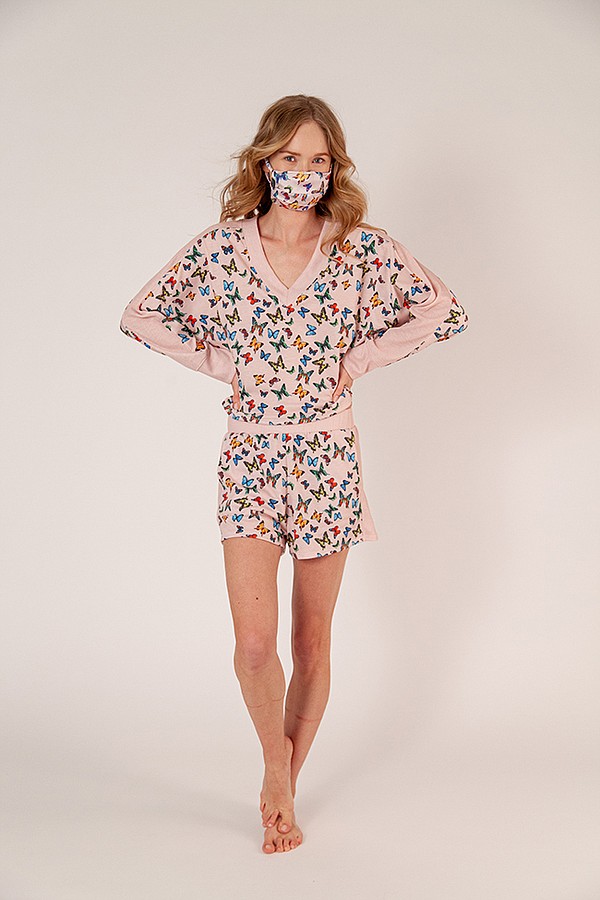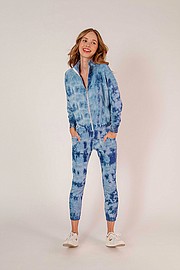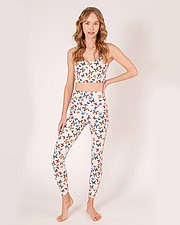LEZAT’S ETHICAL APPAREL
Lezat Enjoys Giving Back Through Ethical, Eco Production
Starting an apparel career as a factory owner can prove demanding for even the most-driven person, but Jaleh Factor wanted to do more. In 2020, after six years making private-label apparel for customers in the activewear, swimwear, knits and wovens categories, working with brands including Beyond Yoga, Fred Segal, Gap, n:Philanthropy, Pure Barre, Reformation, Ultracor and Vimmia, Factor decided to shift her business, Sewby, last year to create masks when the need for personal protective equipment soared with the onset of the COVID-19 pandemic.
“Last year, in early March, my team and I had a conversation about helping out with PPE to help with the shortages and see what we could do. It was interesting because we approached it first and foremost as a donation program,” Factor said. “I had a lot of fabric from 2019, and we had all the components. We started doing a huge program with [the Federal Emergency Management Agency] and DonatePPE.org, and a couple of doctors and groups around the country.”
It was during the time when her factory was making masks that Factor recognized the opportunity to showcase the talents of her close-knit team, whom she considers family, by launching the company’s own brand. In March 2021, as Factor prepared to celebrate seven years of Sewby, she launched Lezat, offering activewear and athleisure pieces that are made ethically in her own Los Angeles factory.
“I am just really fortunate that my team has a skill set that is pretty broad. A lot of factories commit to one thing. We’ve always been very flexible,” Factor explained. “We’ve done swim, and I have a separate business, L.A. Print Lab, where we do textile printing.”
With its Spring 2021 collection, Lezat features feminine pieces in softer hues that Factor feels will resonate with customers who are still demanding casual clothing but in designs that she feels are “cute and easy.” The brand releases in small drops, bypassing the traditional fashion-season calendar, with its next collection scheduled for a May release.
“Lezat is a look-good, feel-good, do-good brand,” Factor said. “We strive to offer easy go-to feminine fashion that is made sustainably and ethically while being competitively priced and designed to make you feel your best. We focus on people, and we care about great style and a smaller footprint left behind.”
Blending her team’s experience from last year, Factor now boasts activewear, loungewear and face masks in her Lezat line. With a name taken from the Farsi word for “enjoy,” Lezat is positioned to expand into additional categories including dresses, plus more activewear for Summer and Fall.
“We can do woven dresses that are beautiful and perfect for going out. We also have our background in activewear and upscale basics,” Factor explained. “We’re pulling on all of our talent, and I think it’s about understanding where that customer is right now, what they are doing and what they are looking for and how we can make them feel great.”
While Factor has focused on making customers look and feel good through her clothing, the Lezat mission relies heavily on sustainable practices. Employees earn living wages, yet the brand is able to remain competitive on pricing, with goods costing between $25 and $175. Currently available in XS–XL, Factor also has plans to expand sizing.
The Spring 2021 Lezat line includes eco-friendlier options in silk, organic cotton and recycled polyester, but Factor remains committed to exploring fresh, ecologically sound materials as they become available. Goods are packaged using compostable options, and hangtags are made using recycled paper. By manufacturing in Los Angeles, she is reducing transportation emissions. While Factor has sought guidance from industry outlets and the city to help reduce the 150 to 250 pounds of waste produced each day, she has developed a heartwarming method of reuse by making dog beds for Los Angeles’ North Central Animal Shelter.
“Textile waste is a huge problem. The city has an initiative to be waste-free by 2025, which is a great goal. We are pretty close to that,” Factor said. “We’ve been able to make beautiful dog beds using remnant fabrics, and [the shelter doesn’t] have a lot of those donations, so why not? If all the factories in L.A. would use their scraps like that it would make a big impact.”
A firm believer that businesses within the apparel industry should be working together to share their sustainable practices, Factor mentions a quote that she adheres to when working toward greater, greener efforts in creating fashion. “There is a quote about small acts,” she said. “When multiplied by millions of people, they can transform the world.”
























